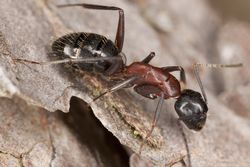How a fungus can control ant behaviour
The HETEROGENIUS (Heterogeneous activity underlying the control of animal behaviour by a fungus) project examined the process from the fungal genome point of view. This was in contrast to earlier studies of this phenomenon, which have focused on the ants’ behaviour. The aim of the project was to understand the complex genetic mechanisms behind adaptive parasite manipulation of host behaviour. Researchers therefore developed protocols for isolating the fungus found in ant cadavers collected in the field and for growing and maintaining fungal cultures. Infection protocols were then developed to reconstruct O. unilateralis infections and behavioural manipulation under laboratory conditions. Ant tissues were cultured and combined with a metabolomics study to determine the fungal metabolites secreted in different parts of the host. This lead to the discovery of novel cyclic depsipetides, a group of mycotoxins. The technique also revealed different secrotomes (secreted proteins) for ant brain and muscle tissue and reacted heterogeneously to brains of different ant species. Furthermore, the study led to the discovery of the first candidate compounds that are likely involved in brain manipulation. RNA from the heads of infected ants (taken while alive and after death following biting) were compared to RNA from the heads of healthy ants. Results indicated that the majority of the fungal genes up-regulated during manipulated behaviour were unique to the O. unilateralis. They also revealed that the fungal parasite might be regulating neuronal stress responses in the host during manipulated biting. The fungus was also found to impair the host’s chemosensory communication and cause apoptosis. In addition, scientists found genes up-regulated during manipulation that may encode for proteins with reported effects on behaviour, neuropathologies and the biosynthesis of secondary metabolites, such as alkaloids. The fungal circadian clock was investigated, with field studies showing that manipulated biting behaviour is synchronised at noon. This indicated that external synchronisers, such as light and temperature might have a significant influence on the parasitic behaviour. HETEROGENIUS has provided valuable insights into parasite-host interactions, especially those concerned with behavioural manipulation. The discovery of genes and metabolites involved in this phenomenon will provide new opportunities towards applied research in the fields of drug discovery and biological control of insect pests.



